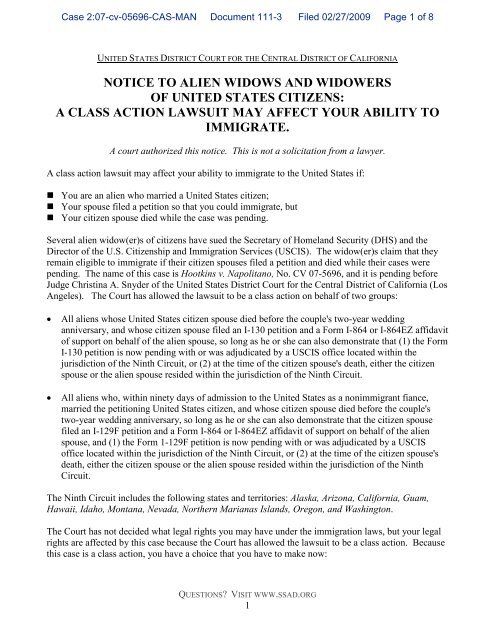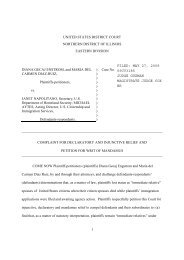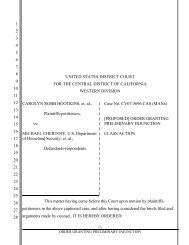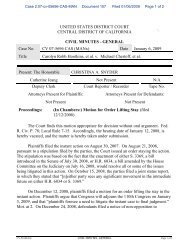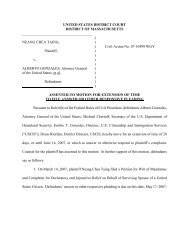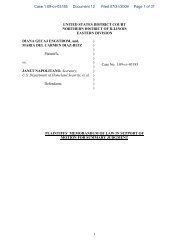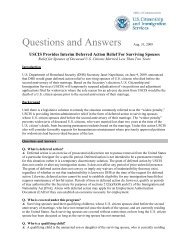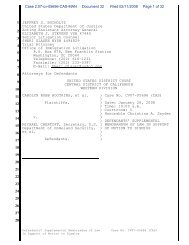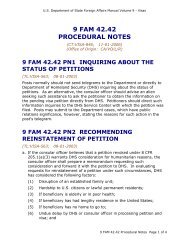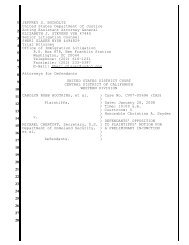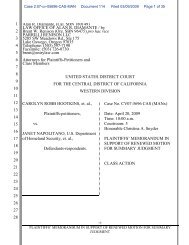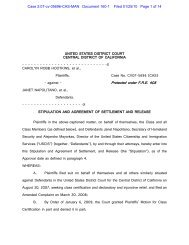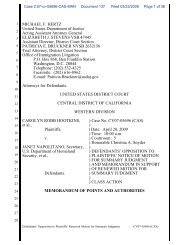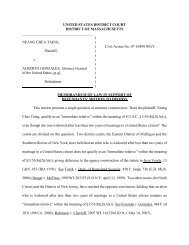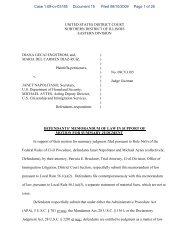notice to alien widows and widowers of united states citizens: a ...
notice to alien widows and widowers of united states citizens: a ...
notice to alien widows and widowers of united states citizens: a ...
Create successful ePaper yourself
Turn your PDF publications into a flip-book with our unique Google optimized e-Paper software.
Case 2:07-cv-05696-CAS-MAN Document 111-3 Filed 02/27/2009 Page 1 <strong>of</strong> 8<br />
UNITED STATES DISTRICT COURT FOR THE CENTRAL DISTRICT OF CALIFORNIA<br />
NOTICE TO ALIEN WIDOWS AND WIDOWERS<br />
OF UNITED STATES CITIZENS:<br />
A CLASS ACTION LAWSUIT MAY AFFECT YOUR ABILITY TO<br />
IMMIGRATE.<br />
A court authorized this <strong>notice</strong>. This is not a solicitation from a lawyer.<br />
A class action lawsuit may affect your ability <strong>to</strong> immigrate <strong>to</strong> the United States if:<br />
You are an <strong>alien</strong> who married a United States citizen;<br />
Your spouse filed a petition so that you could immigrate, but<br />
Your citizen spouse died while the case was pending.<br />
Several <strong>alien</strong> widow(er)s <strong>of</strong> <strong>citizens</strong> have sued the Secretary <strong>of</strong> Homel<strong>and</strong> Security (DHS) <strong>and</strong> the<br />
Direc<strong>to</strong>r <strong>of</strong> the U.S. Citizenship <strong>and</strong> Immigration Services (USCIS). The widow(er)s claim that they<br />
remain eligible <strong>to</strong> immigrate if their citizen spouses filed a petition <strong>and</strong> died while their cases were<br />
pending. The name <strong>of</strong> this case is Hootkins v. Napolitano, No. CV 07-5696, <strong>and</strong> it is pending before<br />
Judge Christina A. Snyder <strong>of</strong> the United States District Court for the Central District <strong>of</strong> California (Los<br />
Angeles). The Court has allowed the lawsuit <strong>to</strong> be a class action on behalf <strong>of</strong> two groups:<br />
• All <strong>alien</strong>s whose United States citizen spouse died before the couple's two-year wedding<br />
anniversary, <strong>and</strong> whose citizen spouse filed an I-130 petition <strong>and</strong> a Form I-864 or I-864EZ affidavit<br />
<strong>of</strong> support on behalf <strong>of</strong> the <strong>alien</strong> spouse, so long as he or she can also demonstrate that (1) the Form<br />
I-130 petition is now pending with or was adjudicated by a USCIS <strong>of</strong>fice located within the<br />
jurisdiction <strong>of</strong> the Ninth Circuit, or (2) at the time <strong>of</strong> the citizen spouse's death, either the citizen<br />
spouse or the <strong>alien</strong> spouse resided within the jurisdiction <strong>of</strong> the Ninth Circuit.<br />
• All <strong>alien</strong>s who, within ninety days <strong>of</strong> admission <strong>to</strong> the United States as a nonimmigrant fiance,<br />
married the petitioning United States citizen, <strong>and</strong> whose citizen spouse died before the couple's<br />
two-year wedding anniversary, so long as he or she can also demonstrate that the citizen spouse<br />
filed an I-129F petition <strong>and</strong> a Form I-864 or I-864EZ affidavit <strong>of</strong> support on behalf <strong>of</strong> the <strong>alien</strong><br />
spouse, <strong>and</strong> (1) the Form 1-129F petition is now pending with or was adjudicated by a USCIS<br />
<strong>of</strong>fice located within the jurisdiction <strong>of</strong> the Ninth Circuit, or (2) at the time <strong>of</strong> the citizen spouse's<br />
death, either the citizen spouse or the <strong>alien</strong> spouse resided within the jurisdiction <strong>of</strong> the Ninth<br />
Circuit.<br />
The Ninth Circuit includes the following <strong>states</strong> <strong>and</strong> terri<strong>to</strong>ries: Alaska, Arizona, California, Guam,<br />
Hawaii, Idaho, Montana, Nevada, Northern Marianas Isl<strong>and</strong>s, Oregon, <strong>and</strong> Washing<strong>to</strong>n.<br />
The Court has not decided what legal rights you may have under the immigration laws, but your legal<br />
rights are affected by this case because the Court has allowed the lawsuit <strong>to</strong> be a class action. Because<br />
this case is a class action, you have a choice that you have <strong>to</strong> make now:<br />
QUESTIONS? VISIT WWW.SSAD.ORG<br />
1
Case 2:07-cv-05696-CAS-MAN Document 111-3 Filed 02/27/2009 Page 2 <strong>of</strong> 8<br />
YOUR LEGAL RIGHTS AND OPTIONS IN THIS LAWSUIT<br />
• DO NOTHING. Stay in this lawsuit. Await the outcome. Give up your right <strong>to</strong> file your<br />
own lawsuit.<br />
If you do nothing, you will be bound by the Court’s decision in this case. This means that, if the<br />
Court decides in favor <strong>of</strong> the Class, the decision will also be in your favor, <strong>and</strong> you may be entitled<br />
<strong>to</strong> a new decision in your immigration case. It also means that if the Court decides the case in<br />
favor <strong>of</strong> DHS <strong>and</strong> USCIS, <strong>and</strong> against the Class, the decision will also be against you. If you are a<br />
member <strong>of</strong> the defined class, <strong>and</strong> do not ask <strong>to</strong> be excluded from this lawsuit, you give up any<br />
rights <strong>to</strong> sue DHS or USCIS separately about the same legal claims in this lawsuit. The case is<br />
scheduled for a hearing on April 20, 2009. If the Court rules in favor <strong>of</strong> DHS <strong>and</strong> USCIS, you will<br />
be bound by the Court’s decision. If the Court rules in favor <strong>of</strong> the Class, you will be notified<br />
about what you must do <strong>to</strong> obtain a new decision on the basis <strong>of</strong> the court’s decision.<br />
• ASK TO BE EXCLUDED BEFORE APRIL 6, 2009. Get out <strong>of</strong> this lawsuit. Get no<br />
benefits from it. Keep your right <strong>to</strong> file your own lawsuit.<br />
If you ask <strong>to</strong> be excluded from this case, you will not be a part <strong>of</strong> this case. If the Court rules in<br />
favor <strong>of</strong> the Class, you won’t be entitled <strong>to</strong> any benefit from that decision. If you ask <strong>to</strong> be<br />
excluded from this case, <strong>and</strong> the Court rules in favor <strong>of</strong> DHS <strong>and</strong> USCIS, you could still sue DHS<br />
or USCIS separately about the same legal claims in your own lawsuit.<br />
Why did I get this <strong>notice</strong>?<br />
BASIC INFORMATION<br />
You received this <strong>notice</strong> because records maintained either by DHS or USCIS or by Surviving Spouses<br />
Against Deportation (SSAD), a private non-pr<strong>of</strong>it group, show that you may have been the beneficiary<br />
<strong>of</strong> a petition (“Form I-130” or “Form I-129”) filed by your deceased spouse, <strong>and</strong> that DHS or USCIS<br />
may have denied or revoked your spouse’s petition because your spouse later died.<br />
The purpose <strong>of</strong> this <strong>notice</strong> is <strong>to</strong> inform you <strong>of</strong> rights that you may have, depending on how the U.S.<br />
District Court in Los Angeles decides a case known as Hootkins v. Napolitano, No. 07-5696. Judge<br />
Christina A. Snyder has certified this case as a class action. Originally the name <strong>of</strong> the case was<br />
Hootkins v. Cher<strong>to</strong>ff, but the name <strong>of</strong> the case was changed when Janet Napolitano succeeded Michael<br />
Cher<strong>to</strong>ff as DHS Secretary.<br />
You have legal rights <strong>and</strong> options that you may exercise before the Court enters judgment.<br />
The Court will hold a hearing <strong>to</strong> decide whether the claims being made against DHS <strong>and</strong> USCIS, on<br />
your behalf, are correct.<br />
What is this lawsuit about?<br />
The lawsuit is about the requirements that an <strong>alien</strong> must satisfy in order <strong>to</strong> immigrate <strong>to</strong> the United<br />
States based on the <strong>alien</strong>’s marriage <strong>to</strong> a citizen, if the citizen dies while the case is pending.<br />
QUESTIONS? VISIT WWW.SSAD.ORG<br />
2
Case 2:07-cv-05696-CAS-MAN Document 111-3 Filed 02/27/2009 Page 3 <strong>of</strong> 8<br />
What is a class action <strong>and</strong> who is involved?<br />
In a class action lawsuit, one or more people called “Class Representatives” sue on behalf <strong>of</strong> other<br />
people who have similar claims (in this case Class Representatives are Carolyn Robb Hookins, Ana<br />
Maria Moncayo-Gigax, Suzanne Henriette De Mailly, Sara Cruz Vargas de Fisher, Raymond Lockett,<br />
Elsa Cecilia Brenteson, Pauline Marie Gobeil, Rose Freeda Fishman-Corman, Khin Thidar Win, Li Ju<br />
Lu, Purita Manuel Pointdexter, Tracy Lee Rudl, Dieu Ngoc Nguyen). The people <strong>to</strong>gether are a<br />
“Class” or “Class Members.” The widow(er)s who sued – <strong>and</strong> all the Class Members like them – are<br />
called the Plaintiffs. The government agencies they sued (in this case DHS <strong>and</strong> USCIS) are called the<br />
Defendants. One court resolves the issues for everyone in the Class – except for those people who<br />
choose <strong>to</strong> exclude themselves from the class.<br />
The Hootkins case also involves claims by 9 Plaintiffs from outside the Ninth Circuit. These 9<br />
Plaintiffs are not members <strong>of</strong> the Class, nor are any <strong>alien</strong>s whose cases are not governed by Ninth<br />
Circuit law.<br />
Why is this a class action?<br />
The Court decided that this lawsuit can be a class action <strong>and</strong> move <strong>to</strong>wards a judgment because it<br />
meets the requirements <strong>of</strong> Federal Rule <strong>of</strong> Civil Procedure 23, which governs class actions in federal<br />
courts. Specifically, the Court found that:<br />
• The number <strong>of</strong> people whose U.S. citizen spouse died while Defendants were processing the<br />
petition for permanent resident status is numerous;<br />
• There are legal questions <strong>and</strong> facts that are common <strong>to</strong> each <strong>of</strong> them;<br />
• The Class Representatives’ claims are typical <strong>of</strong> the claims <strong>of</strong> the rest <strong>of</strong> the Class;<br />
• The Class Representatives, <strong>and</strong> the lawyers representing the Class will fairly <strong>and</strong> adequately<br />
represent the Class’ interests;<br />
• The common legal questions <strong>and</strong> facts are more important than questions that affect only<br />
individuals; <strong>and</strong><br />
• This class action will be more efficient than having many individual lawsuits.<br />
More information about why the Court is allowing this lawsuit <strong>to</strong> be a class action is in the Court’s<br />
Order Certifying the Class, which is available at www.ssad.org.<br />
What is the lawsuit about?<br />
THE CLAIMS IN THE LAWSUIT<br />
The government’s interpretation <strong>of</strong> the immigration law has been that if an <strong>alien</strong>’s citizen spouse died<br />
while the citizen’s petition was pending, the petition could not be approved, <strong>and</strong> the <strong>alien</strong> could not<br />
immigrate. In 2006, in a case called Freeman v. Gonzales, 444 F.3d 1031 (9 th Cir. 2006), the Ninth<br />
Circuit held that the Form I-130 could still be approved after the citizen’s death.<br />
QUESTIONS? VISIT WWW.SSAD.ORG<br />
3
Case 2:07-cv-05696-CAS-MAN Document 111-3 Filed 02/27/2009 Page 4 <strong>of</strong> 8<br />
In November 2007, USCIS provided guidance <strong>to</strong> its adjudica<strong>to</strong>rs for implementing the Freeman<br />
decision in Ninth Circuit cases. This guidance informs USCIS <strong>of</strong>ficers that in a Ninth Circuit case,<br />
under Freeman, USCIS can approve a petition after the petitioner has died. This guidance also advises<br />
USCIS adjudica<strong>to</strong>rs that, even if the petition is approved, the <strong>alien</strong> can immigrate only if a qualified<br />
“substitute sponsor” files an affidavit <strong>of</strong> support (Form I-864) on the <strong>alien</strong>’s behalf, in place <strong>of</strong> the<br />
Form I-864 that either was filed or should have been filed by the deceased citizen. To qualify as a<br />
“substitute sponsor,” the new sponsor must be the spouse, parent, mother-in-law, father-in-law,<br />
sibling, child (if at least 18 years <strong>of</strong> age), son, daughter, son-in-law, daughter-in-law, sister-in-law,<br />
brother-in-law, gr<strong>and</strong>parent, or gr<strong>and</strong>child <strong>of</strong> a sponsored <strong>alien</strong> or a legal guardian <strong>of</strong> a sponsored<br />
<strong>alien</strong>. To permit the filing <strong>of</strong> the substitute sponsor’s Form I-864, the guidance informs USCIS<br />
adjudica<strong>to</strong>rs that they should “revoke” the approval <strong>of</strong> the petition <strong>and</strong> then “reinstate” the approval if<br />
there are “humanitarian reasons” for doing so. If there is no substitute sponsor, or there is a substitute<br />
sponsor, but no showing that “humanitarian reasons” support reinstating the approval, the <strong>alien</strong> will not<br />
be able <strong>to</strong> immigrate, <strong>and</strong> the approval <strong>of</strong> the petition will be treated as having been revoked.<br />
The November 2007 USCIS guidance also indicates that the Freeman case does not apply <strong>to</strong> any case<br />
unless the <strong>alien</strong> beneficiary had also filed a Form I-485 while the petitioner was alive. The guidance<br />
indicates that USCIS can still deny a petition if the <strong>alien</strong> beneficiary was going <strong>to</strong> apply for an<br />
immigrant visa, instead <strong>of</strong> for adjustment <strong>of</strong> status. It also indicates that if the <strong>alien</strong> was already in the<br />
United States, the petition could still be denied if the <strong>alien</strong> did not already apply for adjustment <strong>of</strong><br />
status before the death <strong>of</strong> the United States citizen who filed the petition.<br />
What claims do Plaintiffs make?<br />
The Class Plaintiffs make three basic challenges <strong>to</strong> the November 2007 USCIS guidance:<br />
that the Freeman decision applies <strong>to</strong> any petitions filed by a citizen for his or her spouse, regardless<br />
<strong>of</strong> whether the <strong>alien</strong> had applied for adjustment <strong>of</strong> status before the citizen died;<br />
that <strong>alien</strong> does not have <strong>to</strong> obtain an affidavit <strong>of</strong> support from a substitute sponsor if the deceased<br />
visa petitioner had already executed a Form I-864;<br />
that the provision for the revocation <strong>of</strong> the visa petition approval if there is no substitute sponsor or<br />
no showing <strong>of</strong> “humanitarian reasons” is not valid under the law.<br />
What is the response <strong>of</strong> DHS <strong>and</strong> USCIS?<br />
DHS <strong>and</strong> USCIS maintain that the policy guidance provided <strong>to</strong> USCIS <strong>of</strong>ficers is consistent with the<br />
law. DHS <strong>and</strong> USCIS believe that Freeman applies <strong>to</strong> a petition only if the <strong>alien</strong> had also filed a Form<br />
I-485. DHS <strong>and</strong> USCIS also maintain that if there is no enforceable Form I-864 from a substitute<br />
sponsor or there is no showing <strong>of</strong> “humanitarian reasons: the <strong>alien</strong> is not eligible <strong>to</strong> immigrate.<br />
Has the Court decided who is right?<br />
No. The Court has not decided whether DHS <strong>and</strong> USCIS or the Plaintiffs are correct. By establishing<br />
the Class <strong>and</strong> issuing this Notice, the Court is not suggesting that the Plaintiffs will win or lose this<br />
case. The Plaintiffs must prove their claims at a summary judgment hearing <strong>to</strong> be held April 20, 2009.<br />
QUESTIONS? VISIT WWW.SSAD.ORG<br />
4
Case 2:07-cv-05696-CAS-MAN Document 111-3 Filed 02/27/2009 Page 5 <strong>of</strong> 8<br />
What are the Plaintiffs asking for?<br />
The Plaintiffs want the Court <strong>to</strong> decide that Freeman applies <strong>to</strong> any petition that any citizen filed for<br />
any <strong>alien</strong> spouse, whether or not the <strong>alien</strong> filed a Form I-485 before the citizen died.<br />
The Plaintiffs also want the Court <strong>to</strong> decide that an <strong>alien</strong> whose spouse has died does not need a valid<br />
<strong>and</strong> enforceable Form I-864 from a substitute sponsor. Since the Plaintiffs believe that no Form I-864<br />
from a substitute sponsor is needed if the petitioner executed a Form I-864, they also believe that there<br />
is no need <strong>to</strong> “revoke” <strong>and</strong> “reinstate” the approval <strong>of</strong> the petition, <strong>and</strong> also that any such revocation is<br />
not legally valid. Plaintiffs also want the Court <strong>to</strong> decide that the regulation that provides for<br />
revocation <strong>of</strong> approval unless “humanitarian reasons” are shown is not legally valid.<br />
Is there any relief available <strong>to</strong> widow(er)s now?<br />
Under current DHS <strong>and</strong> USCIS policy, unless the widow(er) was married <strong>to</strong> the citizen petitioner for at<br />
least two years, a widow(er) whose citizen petitioner dies while the petition is pending may immigrate<br />
only if:<br />
the widow(er) filed a Form I-485 Adjustment <strong>of</strong> Status Application prior <strong>to</strong> the citizen’s death;<br />
USCIS approves the citizen petitioner’s petition under Freeman;<br />
the widow(er) submits in support <strong>of</strong> his or her Form I-485 a new Form I-864 from a substitute<br />
sponsor; <strong>and</strong>,<br />
USCIS decides, for humanitarian reasons, not <strong>to</strong> revoke the approval <strong>of</strong> the citizen’s petition<br />
No benefits are available <strong>to</strong> widow(er)s who do not meet these requirements now because the Court<br />
has not yet decided whether these requirements are consistent with the law. There is no guarantee that<br />
any benefits will be obtained. If they are, you will be notified about how <strong>to</strong> request benefits.<br />
Who is included in the lawsuit?<br />
WHO IS IN THE CLASS?<br />
According <strong>to</strong> the court’s ruling, the class action will include all <strong>alien</strong> spouses whose U.S. citizen<br />
spouses filed an immigrant petition (Form I-130 or I-129F) <strong>and</strong> filed an affidavit <strong>of</strong> support (Form I-<br />
864), <strong>and</strong> whose spouse died before the couple’s two-year wedding anniversary. There are geographic<br />
limitations <strong>to</strong> this class action. The full definition <strong>of</strong> the two classes is:<br />
• All <strong>alien</strong>s whose United States citizen spouse died before the couple's two-year wedding<br />
anniversary, <strong>and</strong> whose citizen spouse filed an I-130 petition <strong>and</strong> a Form I-864 or I-864EZ affidavit<br />
<strong>of</strong> support on behalf <strong>of</strong> the <strong>alien</strong> spouse, so long as he or she can also demonstrate that (1) the Form<br />
I-130 petition is now pending with or was adjudicated by a USCIS <strong>of</strong>fice located within the<br />
jurisdiction <strong>of</strong> the Ninth Circuit, or (2) at the time <strong>of</strong> the citizen spouse's death, either the citizen<br />
spouse or the <strong>alien</strong> spouse resided within the jurisdiction <strong>of</strong> the Ninth Circuit.<br />
• All <strong>alien</strong>s who, within ninety days <strong>of</strong> admission <strong>to</strong> the United States as a nonimmigrant fiance,<br />
married the petitioning United States citizen, <strong>and</strong> whose citizen spouse died before the couple's<br />
QUESTIONS? VISIT WWW.SSAD.ORG<br />
5
Case 2:07-cv-05696-CAS-MAN Document 111-3 Filed 02/27/2009 Page 6 <strong>of</strong> 8<br />
two-year wedding anniversary, so long as he or she can also demonstrate that the citizen spouse<br />
filed an I-129F petition <strong>and</strong> a Form I-864 or I-864EZ affidavit <strong>of</strong> support on behalf <strong>of</strong> the <strong>alien</strong><br />
spouse, <strong>and</strong> (1) the Form 1-129F petition is now pending with or was adjudicated by a USCIS<br />
<strong>of</strong>fice located within the jurisdiction <strong>of</strong> the Ninth Circuit, or (2) at the time <strong>of</strong> the citizen spouse's<br />
death, either the citizen spouse or the <strong>alien</strong> spouse resided within the jurisdiction <strong>of</strong> the Ninth<br />
Circuit.<br />
The class action first requested approval <strong>of</strong> a nationwide class, but the court approved only those cases<br />
that fall within the Ninth Circuit. The Ninth Circuit includes the following <strong>states</strong> <strong>and</strong> terri<strong>to</strong>ries:<br />
Alaska, Arizona, California, Guam, Hawaii, Idaho, Montana, Nevada, Northern Marianas Isl<strong>and</strong>s,<br />
Oregon, <strong>and</strong> Washing<strong>to</strong>n. Therefore, those <strong>alien</strong> spouses whose citizen spouses filed the required<br />
forms <strong>and</strong> whose forms were adjudicated by a USCIS <strong>of</strong>fice located within the Ninth Circuit, or are<br />
pending there, or who resided there at the time <strong>of</strong> the spouse’s death, are included.<br />
Who is not included in the lawsuit?<br />
The lawsuit does not include <strong>alien</strong> spouses whose U.S. citizen spouses did not file an immigrant<br />
petition (I-130 or I-129F) on their behalf. In such “non-petitioning” cases, a change in the law is<br />
needed. For more information on the legislation, please refer <strong>to</strong> the SSAD website (www.ssad.org).<br />
The lawsuit does not include <strong>alien</strong> spouses whose citizen spouse filed for them, but whose petitions<br />
were adjudicated by USCIS <strong>of</strong>fices outside the Ninth Circuit, unless at the time <strong>of</strong> the citizen spouse’s<br />
death either the citizen spouse or the <strong>alien</strong> spouse resided within the Ninth Circuit.<br />
I am still not sure if I am included.<br />
If you are still not sure whether you are included, you can get free help at www.ssad.org, or by calling<br />
or writing <strong>to</strong> the lawyers in this case.<br />
What happens if I do nothing at all?<br />
YOUR RIGHTS AND OPTIONS<br />
You don’t have <strong>to</strong> do anything if you want <strong>to</strong> keep the possibility <strong>of</strong> receiving benefits from this<br />
lawsuit. By doing nothing you stay in the Class. If you do nothing <strong>and</strong> the Plaintiffs obtain benefits,<br />
either as a result <strong>of</strong> judgment or settlement, you will be notified about how <strong>to</strong> apply for benefits (or<br />
how <strong>to</strong> ask <strong>to</strong> be excluded from any settlement). Keep in mind that if you do nothing now, regardless<br />
<strong>of</strong> whether the Plaintiffs win or lose, you will not be able <strong>to</strong> sue, or continue <strong>to</strong> sue, DHS <strong>and</strong> USCIS –<br />
as part <strong>of</strong> any other lawsuit – about the same legal claims that are the subject <strong>of</strong> this lawsuit. You will<br />
also be legally bound by all <strong>of</strong> the Orders that the Court issues <strong>and</strong> judgments the Court makes in this<br />
class action.<br />
Why would I ask <strong>to</strong> be excluded?<br />
If you already have your own lawsuit against DHS or USCIS <strong>and</strong> want <strong>to</strong> continue with it, you need <strong>to</strong><br />
ask <strong>to</strong> be excluded from the Class. If you exclude yourself from the Class – which also means you<br />
QUESTIONS? VISIT WWW.SSAD.ORG<br />
6
Case 2:07-cv-05696-CAS-MAN Document 111-3 Filed 02/27/2009 Page 7 <strong>of</strong> 8<br />
remove yourself from the Class, <strong>and</strong> is sometimes called “opting-out” <strong>of</strong> the Class – you won’t get any<br />
benefits from this lawsuit even if the Plaintiffs obtain them as a result <strong>of</strong> summary judgment or from<br />
any settlement (that may or may not be reached) between DHS <strong>and</strong> USCIS <strong>and</strong> the Plaintiffs.<br />
However, you may then be able <strong>to</strong> sue or continue <strong>to</strong> sue DHS <strong>and</strong> USCIS for benefits. If you exclude<br />
yourself, you will not be legally bound by the Court’s judgments in this class action.<br />
If you start your own lawsuit against DHS or USCIS after you exclude yourself, you will have <strong>to</strong> hire<br />
<strong>and</strong> pay for your own lawyer (or get a lawyer who agrees <strong>to</strong> do it for free, or “pro bono”) for that<br />
lawsuit, <strong>and</strong> you’ll have <strong>to</strong> prove your claims. If you do exclude yourself so you can start or continue<br />
your own lawsuit against DHS or USCIS, you should talk <strong>to</strong> your own lawyer soon, because your<br />
claims may be subject <strong>to</strong> a statute <strong>of</strong> limitations.<br />
How do I ask the Court <strong>to</strong> exclude me from the Class (How do I opt-out)?<br />
To ask <strong>to</strong> be excluded (<strong>to</strong> “opt-out”), you must send an “Exclusion Request” in the form <strong>of</strong> a letter sent<br />
by mail, stating that you want <strong>to</strong> be excluded from Hootkins v. Napolitano. Be sure <strong>to</strong> include your<br />
name <strong>and</strong> address, <strong>and</strong> sign the letter. You must mail your Exclusion Request, postmarked by April 6,<br />
2009, <strong>to</strong>: Hootkins v. Napolitano Exclusions, Parrilli Renison LLC, 5285 SW Meadows Rd., Ste. 175,<br />
Lake Oswego, OR 97035. You may also get an Exclusion Request form at the website, www.ssad.org.<br />
Do I have a lawyer in this case?<br />
THE LAWYERS REPRESENTING YOU<br />
The Court decided that the law firms <strong>of</strong> Parrilli Renison LLC, <strong>of</strong> Lake Oswego, Oregon, <strong>and</strong> the Law<br />
firm <strong>of</strong> Alan Diamante, <strong>of</strong> Los Angeles, California, are qualified <strong>to</strong> represent you <strong>and</strong> all Class<br />
Members. Together the law firms are called “Class Counsel.” They are experienced in h<strong>and</strong>ling<br />
similar cases against DHS <strong>and</strong> USCIS. More information about these law firms, their practices, <strong>and</strong><br />
their lawyers’ experience is available at www.entrylaw.com.<br />
Should I get my own lawyer?<br />
You do not need <strong>to</strong> hire your own lawyer because Class Counsel is working on your behalf. But, if<br />
you want your own lawyer, you will have <strong>to</strong> pay that lawyer (or get a lawyer <strong>to</strong> agree <strong>to</strong> work for you<br />
for free, or “pro bono”). For example, you can ask him or her <strong>to</strong> appear in Court for you if you want<br />
someone other than Class Counsel <strong>to</strong> speak for you.<br />
How will the lawyers be paid?<br />
If Plaintiffs prevail on the claims, Class Counsel may ask the Court for fees <strong>and</strong> expenses. If the Court<br />
grants Class Counsels’ request, the fees <strong>and</strong> expenses would be paid separately by DHS <strong>and</strong>/or USCIS.<br />
If Defendants prevail, you will not be required <strong>to</strong> pay fees or expenses <strong>to</strong> Class Counsel.<br />
QUESTIONS? VISIT WWW.SSAD.ORG<br />
7
Case 2:07-cv-05696-CAS-MAN Document 111-3 Filed 02/27/2009 Page 8 <strong>of</strong> 8<br />
THE HEARING<br />
How <strong>and</strong> when will the Court decide who is right?<br />
As long as the case isn’t resolved by a settlement or otherwise, Class Counsel will have <strong>to</strong> prove the<br />
Plaintiffs’ claims at a hearing for summary judgment. The hearing is set for April 20, 2009, in the<br />
United States District Court for the Central District <strong>of</strong> California, 312 N. Spring Street, Courtroom 5,<br />
Los Angeles, California 90012. During the hearing, the Judge will hear arguments from both sides <strong>to</strong><br />
help the Judge reach a decision about whether the Plaintiffs or Defendants are right about the claims in<br />
the lawsuit. There is no guarantee that the Plaintiffs will win, or that they will get any benefits for<br />
Class Members.<br />
Do I have <strong>to</strong> come <strong>to</strong> the hearing?<br />
You do not need <strong>to</strong> attend the hearing. Class Counsel will present the case for the Plaintiffs, <strong>and</strong> DHS<br />
<strong>and</strong> USCIS will present the defenses. You <strong>and</strong>/or your own lawyer are welcome <strong>to</strong> come at your own<br />
expense.<br />
Will I be given immigration benefits after the hearing?<br />
If the Plaintiffs obtain benefits as a result <strong>of</strong> the hearing or a settlement, you will be notified about how<br />
<strong>to</strong> participate. We do not know how long this will take.<br />
Are more details available?<br />
GETTING MORE INFORMATION<br />
Visit the website www.ssad.org, where you will find the Court’s Order Certifying the Class, the<br />
Complaint submitted by the Plaintiffs, the Defendant’s Answer <strong>to</strong> the Complaint, as well as an<br />
Exclusion Request form. You may also speak <strong>to</strong> one <strong>of</strong> the lawyers by calling (503) 597-7190, or by<br />
writing <strong>to</strong> Hootkins v. Napolitano Class Action, Parrilli Renison LLC, 5285 SW Meadows Rd., Ste.<br />
175, Lake Oswego, OR 97035.<br />
For further information, please visit the website: www.ssad.org<br />
QUESTIONS? VISIT WWW.SSAD.ORG<br />
8


